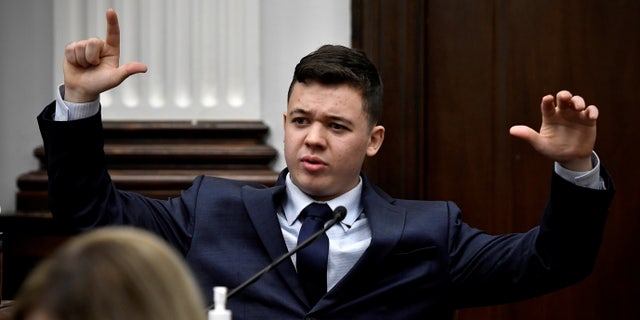Kyle Rittenhouse must be protected from campus mobs
Kyle Rittenhouse rips media
Chastises Biden for comments on verdict
President Joe Biden and media figures are not the only ones who are “angry” after a jury acquitted Kyle Rittenhouse of five charges stemming from his fatal shooting two men and the wounding of a third during rioting in Kenosha, Wisconsin, in 2020.
Many are using the verdict as an excuse to denounce the entire legal system as racist, even though the makeup of the Rittenhouse jury – 11 Whites and one African American – is identical to the jury that recently convicted three men in the killing of Ahmaud Arbery in Georgia. Critics also ignore that much of the coverage of the Rittenhouse case ignored evidence supporting his claim of self-defense.
Now students and groups at Arizona State University are planning a rally against Rittenhouse and demanding that he be expelled. Demands for such extrajudicial punishments may seem legitimate to critics of the verdict with leaders like Biden calling Rittenhouse a “white supremacist” before any investigation was completed and legal analysts calling the entire trial “white supremacy on steroids.” Rittenhouse is likely to face such campaigns to bar him from any campus as he seeks to continue his education.
Students groups like MEChA (Movimiento Estudiantil Chicanx de Aztlán), Students for Socialism, Students for Justice in Palestine and the Multicultural Solidarity Coalition are organizing a rally this week to “get murderer Kyle Rittenhouse off [the] campus.” He is not on campus since he was enrolled as an online student (Indeed, he may not be currently enrolled for any classes at ASU). Students and faculty are being called to the rally to “protect students from a violent, blood-thirsty murderer.”
In addition, ASU student Taskina Bhuiya started a Change.org petition to denounce the verdict and to call for Rittenhouse to be “held accountable for the crimes he has committed.” Without a sense of irony, the petition declares, “ASU should be a safe and inclusive place for all students, which will be disrupted if Kyle Rittenhouse is allowed to attend this school.” Inclusive unless you are an acquitted individual who must be “held accountable.” Hundreds have signed the petition insisting that “Rittenhouse should pay for his crimes.”
The campaign reflects a growing sense that the legal system is only worthy of respect (or even protection) if it rules in the way that we demand. It is the same mentality that has led members of Congress, law professors, and others to demand the expansion or restriction of the Supreme Court because it now has a conservative majority. Liberal justices like the late Ruth Bader Ginsburg and Stephen Breyer have opposed such efforts as inimical to the rule of law.
Universities have long been dominated by liberal faculty but a new orthodoxy has emerged. Conservative students often feel that access to education is conditioned on their silent adherence to compelled values and language. That is if they are even allowed to attend such schools in the first place.
The campaign against Rittenhouse reflects a growing sense that the legal system is only worthy of respect (or even protection) if it rules in the way that we demand.
We saw a similar campaign to block Nick Sandmann, who was wrongly accused of racist attacks on a Native American activist, from attending Transylvania University. Even though some media outfits corrected their false coverage of Sandmann and others settled the lawsuits he filed against them, the ACLU’s Samuel Crankshaw in Kentucky denounced Transylvania University for allowing Sandmann access to an education at the school.
Without a scintilla of support, Crankshaw labeled Sandmann a “provocateur in training with no intention of learning.” Dr. Avery Tompkins, an assistant professor and diversity scholar at Transylvania, publicly promised to closely monitor Sandmann while he was on campus: “If he were to cause problems by being disruptive, trolling or engaging in unethical behavior of any kind, I would immediately document it (just like I would for any student doing the same thing)…and he would just be putting himself in a position for me to file a conduct report.”
The fact is that Rittenhouse cannot be expelled or kept off ASU’s campus due to such mob measures. He would quickly prevail in court. However, the rally and the rhetoric magnify the risk to his safety by those who demand “accountability” regardless of any verdict.
We have seen faculty members join such mob efforts, even attacking others on campus, blocking speakers, destroying political signs, or encouraging attacks on student journalists.
University of Rhode Island professor Erik Loomis defended the murder of a conservative protester and said he saw “nothing wrong” with such acts of violence. Other faculty members have made similarly disturbing comments such as “detonating white people,” denouncing police, calling for Republicans to suffer, strangling police officers, celebrating the death of conservatives, calling for the killing of Trump supporters, supporting the murder of conservative protesters and other outrageous statements.
FILE PHOTO: Kyle Rittenhouse speaks with his attorneys before the jury is relieved for the evening during his trial at the Kenosha County Courthouse in Kenosha, U.S., November 18, 2021. Sean Krajacic/Pool via REUTERS/File Photo
It is less common to hear professors today speak out for the rights of conservatives or others who are being targeted by campaigns on campus. The risk is simply too great that they will be “tagged” as intolerant, racist or reactionary.
ASU has responded to the controversy. Rather than rejecting the premise of barring a student based on such protests, the school simply noted that he is not currently enrolled. There is no need to cancel him if he is not currently a student. Problem solved. Yet, the planned rally still illustrates how education is now seen as a means to mete out punishment in lieu of conviction.
FILE PHOTO: Kyle Rittenhouse talks about how Gaige Grosskreutz was holding his gun when Rittenhouse shot him on Aug. 25, 2020, while testifying during his trial at the Kenosha County Courthouse in Kenosha, Wisconsin, November 10, 2021. Sean Krajacic/Pool via REUTERS/File Photo
It is not surprising that Rittenhouse, who was looking at life in prison, did not register for classes this coming term. That would have been rather presumptuous with many in the media declaring him all but convicted before the start of opening arguments. He is likely to now move on with his life and will seek admission to ASU or another school. The question is whether he will be allowed access to an education or whether schools will yield to this campaign to bar him from any campus.
It is common for former felons (including violent offenders) to take classes or give lectures on campuses without such protests. It is not clear whether any school will admit this acquitted teenager given the protests at ASU and other universities.
If admitted, Rittenhouse has every right to attend ASU in person and has every right to expect that he can do so safely. If ASU cannot muster the integrity and courage to reaffirm those rights publicly, it has abandoned a core defining element for higher education.
Colleges often sit in cringing silence as individual students are targeted and harassed. It is not clear whether Rittenhouse will seek to continue at ASU or other universities. However, his education should not be treated as a vehicle for collective extrajudicial punishment.
This column has been adapted from a post on the author’s blog: JONATHAN TURLEY: Res ipsa loquitur – The thing itself speaks.
Source: Read Full Article





